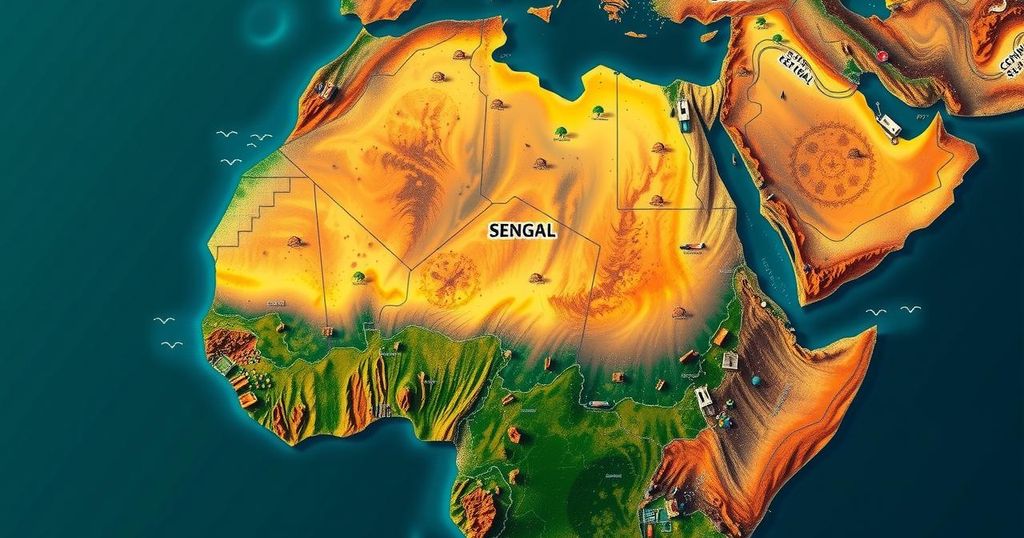Climate Change and Development: Navigating Senegal’s Challenges

Senegal is facing significant challenges due to climate change, which threatens its economic growth and social inclusivity. The Country Climate and Development Report emphasizes the urgent need for climate action intertwined with development strategies. Proposed measures include leveraging renewable energy, investing in sustainable urban areas, and mobilizing financial resources through public-private partnerships. The CCDR aims to guide Senegal in achieving resilience against climate impacts while fostering inclusive economic growth.
Senegal’s development trajectory faces significant challenges due to climate change, despite being one of the region’s fastest-growing economies. The country grapples with economic disparities and a slow reduction in poverty levels, exacerbated by its vulnerability to external shocks and climate risks. To pursue inclusive growth, Senegal must directly address these vulnerabilities, particularly given its coastal geography and reliance on natural resources. The Country Climate and Development Report (CCDR) advocates for strategic measures aimed at bolstering climate action alongside sustainable development, highlighting that the funding required for such initiatives is relatively modest compared to potential economic gains. The proposed energy transition not only aims to meet the country’s climate objectives but also presents an opportunity to surpass Nationally Determined Contributions (NDCs) and work towards achieving net-zero emissions by 2050. A pivotal aspect of the transition is harnessing Senegal’s substantial renewable energy resources, particularly solar power, which can provide a cost-effective solution to rising energy demands while promoting decarbonization efforts. In the immediate term, leveraging domestic gas can help phase out more polluting energy sources while ensuring energy reliability and affordability. The CCDR underscores the importance of prioritizing no-regret adaptation strategies that align with urgent developmental needs to enhance resilience against diverse climate impacts. Investment in sustainable urban development is also crucial, as it fosters economic growth while minimizing ecological harm. To address the enormous financial requirements needed for climate action, active participation from both public and private sectors is essential. Mobilizing significant resources will hinge upon creating a conducive environment for investments in climate-resilient solutions. The government plays a vital role in enabling this environment by providing incentives, reinforcing the financial sector, and exploring innovative funding mechanisms, including sustainability-linked bonds. Ultimately, the CCDR serves as a critical tool for Senegal in navigating the intertwined challenges of climate change and development, guiding stakeholders towards prioritizing impactful initiatives that enhance resilience and prosperity.
Senegal’s socioeconomic landscape is characterized by rapid growth in recent years; however, persistent inequalities and poverty levels remain concerning. The intersection of climate change and development is crucial for Senegal, especially given its geographical vulnerabilities including a long coastline and dependence on agriculture and fisheries. The impacts of climate change, along with global economic uncertainties, disproportionately affect the most vulnerable populations, posing a significant risk to the nation’s sustainable development goals. Therefore, there is an urgent need for strategic interventions aimed at fostering resilience and sustainable growth while addressing climate-related challenges.
In conclusion, the challenges posed by climate change present a formidable barrier to Senegal’s development goals. The Country Climate and Development Report highlights the importance of integrating climate action into economic planning to maximize potential benefits and ensure resilience. Strategic investment in renewable energy, sustainable urban development, and innovative financing mechanisms will be vital for achieving a sustainable and inclusive economy. Collaborative efforts between the government, private sector, and international partners are essential for overcoming financial barriers and driving meaningful climate action that secures Senegal’s development aspirations.
Original Source: www.worldbank.org






